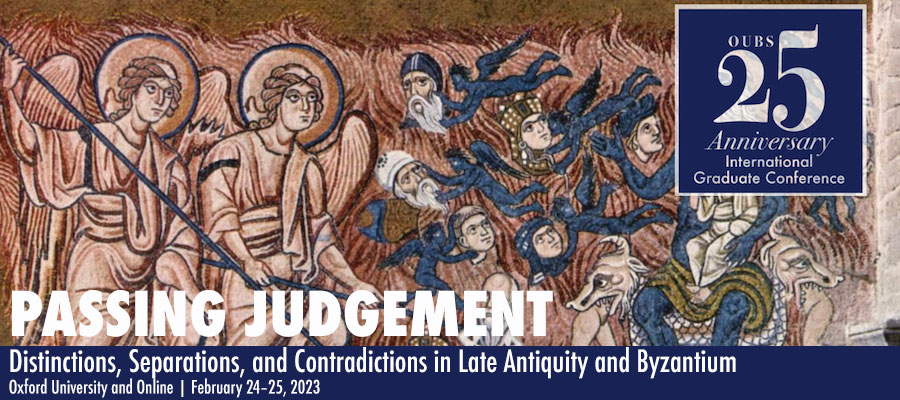Passing Judgement: Distinctions, Separations, and Contradictions in Late Antiquity and Byzantium, 25th Annual Oxford University Byzantine Society International Graduate Conference, February 24–25, 2023
We are pleased to announce the 25th Annual Oxford University Byzantine Society International Graduate Conference for the 24th – 25th February 2023. This important milestone marks the 25th annual conference, and we hope it serves as a fitting celebration of the society and its history. Papers are invited to approach the theme of ‘Passing Judgement: Distinctions, Separations, and Contradictions’ within the Late Antique and Byzantine world, broadly defined.
Individuals and communities in the Late Antique and Byzantine world constantly sought to set the limits on the world around them. They distinguished one thing from another, separated physical and conceptual phenomena, and in doing so amended or contradicted previous (and contemporary) distinctions and separations. This conference seeks to investigate the dynamics of how perceptions of difference functioned, as well as exploring the fallibilities of these perceptions. Over a thousand-year period, peoples’ approaches to one another, their neighbours, the built environment, and the metaphysical worlds all drew from a rich tradition of Roman, Hellenic, and Christian pasts, yet constantly interpreted through contemporary eyes. Their imperial tradition was an inheritance of Augustus and Constantine, the topography reflected that described by Homer, and their churches were those preached to by the apostles. This could convey a sense of timelessness, but the people beneath the surface were more mutable and did not always represent their historical predecessors. How then, did the interpretations of authorities and traditions to which these people belonged, develop? Individuals and communities sought the distinctions that defined their contemporary world from authorities, yet their evolution in judgement and practice was an active, ongoing process of negotiation. If an ancient ethnographer delineated a community or object a millennia ago through negative characteristics, how valid was the later Byzantine invocation of this to their own society, and how accepted?
This conference seeks to draw together papers which explore these distinctions, separations, and contradictions. These can be viewed through a diachronic or a synchronic lens, that is to say, papers might address the Byzantine and Late Antique worlds’ shifting integration and acceptance of peoples, places, or traditions which were considered (by themselves or others) at times ‘Roman’ and then subsequently otherised or even re-embraced. Otherwise, they might address a case study of how a particular individual or community sought to demarcate between in-group and out-group. Therefore, contributors might address how these boundaries changed over time, developing alongside contemporary mentalities and demands. We also seek papers which explore the models and authorities used to make such demarcations – and the ways in which these were interpreted – both within a literary and a social context (or indeed, in the intersections between the two).
In literary settings, papers might investigate the straddling of multiple identities by an individual, and the management of consequent boundaries or contradictions. Contributors might highlight a firmer yet perhaps inherently contradictory narrative presented within a work. In these distinct contexts, we encounter a presumption of distinctions that are at once generally agreed upon yet also surprisingly idiosyncratic and non-representative; and the usage of these allows us to gauge the perspectives or agenda of an author. The creation, maintenance, or rejection of distinctions are of particular importance in genres that pit one perspective against that of another such as commentaries, correspondence, encomia, ekphrasis, poetry, ethnography, geography. Moreover, distinctions and divisions are inherent when the author contends with religious controversy or discusses tendentious social or cultural phenomena; and an individual’s understanding of the divisions between in- and out-group could produce wide variations in tolerance. Most critically, we seek to investigate the recognition that distinctions assumed by one author, can differ from others and evolve over time. In the fluidity of distinguishing and separating , we often find that the things which we think define us all can so often quickly collapse when tested.
The framework of distinctions and separations (and the ambiguities present within) is widely applicable, and novel and imaginative approaches to these ideas is strongly encouraged.
The Oxford University Byzantine Society seeks papers from a broad range of themes within Late Antique and Byzantine Studies, including but not limited to:
- Distinctions, separations, and contradictions in identity; e.g., social, ethnocultural, or geographical (from the perspective of the identity group itself or externally). Case studies or development across time.
- Ethnic and racial studies in Late Antique, Byzantine, and post-Byzantine contexts (e.g., ethnogenesis, interactionism, ethnomethodology etc.)
- Discussions of social class or gender within the Late Antique and Byzantine worlds.
- Political and (post-)imperial perspectives, particularly regarding marginalised or marginal groups or ‘subject peoples.’
- Encounters with the foreign or religious ‘other,’ and how this othering takes place.
- The creation and development of divisions in a wide range of social or religious contexts (ingroup and outgroup, correct and incorrect practice, believer, and nonbeliever).
- Distinctions marked within literary sub-genres, e.g., epistolography, hagiography etc.
- The use of classical or patristic authorities in Late Antique and Byzantine contexts, and how these were interpreted (with a focus on contradictions).
- Distinctions and contradictions in the creation of an authorial viewpoint.
- Religious division and union.
- Separations between correct and incorrect belief and practice (legislative, religious, and political).
- Physical and mental separations in the built environment.
- Social and spatial perspectives on the creation and maintenance of distinctions.
- Marking distinctions in time, liminal moments (historical and in contemporary academic discussion of Byzantium).
- The creation, maintenance, and challenging of symbolic boundaries (religious, social, cultural). Conversion as a crossing of boundaries.
The conference will have a hybrid format, with papers delivered at the Oxford University History Faculty and livestreamed for a remote audience. Accepted speakers should expect to participate in person.
